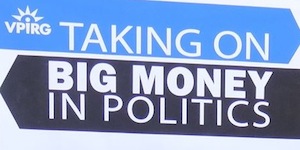How’s that for irony: Well-funded lobbyists ‘taking on big money in politics’

GET THE MONEY OUT: One of the best-funded and most influential lobbying organizations in Vermont wants to ‘take on big money in politics.’
By Bruce Parker | Vermont Watchdog
The irony of one of Vermont’s most influential and well-funded lobbying organizations speaking out against lobbyists and political funding may be lost on some. For others, it’s impossible to miss.
Last week in Burlington, Vermont Public Interest Research Group, or VPIRG, kicked off its summer canvassing campaign to urge Vermonters to oppose undue influence and money in politics.
The group’s campaign, “Taking on Big Money in Politics,” has enlisted about 55 college students to knock on the doors of 80,000 Vermonters. It’s calling for a ban on donations by corporations and wealthy individuals.
“VPIRG is supporting a plan that will rein-in the power of lobbyists, that will ban corporate contributions, that will demand more transparency from Super PACs, and that will amplify the voices of real citizens and real people in this state,” Paul Burns, executive director of VPIRG, said at a recent news conference.
Despite Burns’ appearance alongside students and Ben Cohen of Ben & Jerry’s, VPIRG’s dominance as Vermont’s largest consumer and environmental advocacy organization is hardly the work of college kids.
According to the group’s 990 tax forms from 2012, the combined revenues of VPIRG and the VPIRG Research and Education Fund totaled $1,500,619, nearly all of which came from contributions — not the penny ante kind.
The summer campaign itself reveals the group’s solid funding. According to VPIRG’s web site, canvassers stand to earn as much as $4,000 to $8,000 dollars for the summer job — a potential spend of $440,000.
As for reining-in the power of lobbyists, information from the secretary of state’s office shows VPIRG’s lobbying team is the largest in the state, fielding as many as 15 lobbyists over the past two years. By comparison, IBM employs 11 lobbyists, and Presidio, Vermont Electric Power Co., and the Vermont Workers’ Center all employ nine.
The 2013 lobbying pay for VPIRG’s influencers shows ample political influence at the Vermont statehouse: Paul Burns ($30,203); Lauren Hierl ($15,872); Falko Schilling ($15,349); Ben Walsh ($14,164); Elizabeth Edsell ($10,280); Colleen Halley Thomas ($8,220); Leah Marsters ($8,726); Taylor Johnson ($6,397).
GRASSROOTS OR ASTROTURF?: Handwritten signs for VPIRG’s summer canvassing campaign flood the state capital.
According to John McClaughry, vice president of Vermont’s Ethan Allen Institute, VPIRG is a well-oiled political machine with a structure that allows it to skirt lobbying spending limits.
“VPIRG is two organizations — one is a 501(c)(3) and one is a 501(c)(4). The c-3 can elect to spend 20 percent of its money lobbying, but the c-4 has no restriction at all on lobbying,” he said.
“The c-4 can go out as they do to the grassroots and say ‘stamp out toxic waste’ or ‘stamp out money in politics,’ and get their email addresses and mobilize them to call their senators and representatives to vote for whatever bill VPIRG is peddling. That isn’t lobbying.”
Despite the organization’s call for transparency, the group does not reveal its list of donors, nor the size of contributions.
However, VPIRG’s board of trustees reveals cozy ties with executives of the state’s top solar companies and wind farms — people who benefit directly from the group’s renewable energy advocacy.
VPIRG board member Duane Peterson is a co-president of SolarCommunities, Inc., whose solar-panel company, SunCommon, was controversially spun off from VPIRG in 2012. A Form D filing with the U.S. Securities and Exchange Commission lists SolarCommunities’ annual revenues between $5 million and $25 million.
VPIRG’s treasurer, Mathew Rubin, is president of East Haven Windfarm, a commercial wind energy business in the Northeast Kingdom, and of Spruce Mountain Design, a company that operates hydroelectric power plants in Vermont.
The group also has ties to David Blittersdorf, a former VPIRG trustee and founder of NRG Systems. Blittersdorf is now CEO of AllEarth Renewables in Williston.
“VPIRG was essentially a wholly owned subsidiary of David Blittersdorf. Their issue was subsidies for renewable energy,” McClaughry said.
“These guys who stood to make a bundle out of renewable energy mandates and subsidies were the guys that raised the money to fund VPIRG.”
According to McClaughry, VPIRG’s political activities directly benefit the renewable industry.
“To make that business pay, you need lots of subsidies and a renewables portfolio standard to force the utilities to buy renewable power generated by all these partnerships — and at five times the price of power on the grid. It’s scandalous. I call this the ‘renewable-industrial complex.’”
With so many ties to renewable energy businesses, it’s little wonder VPIRG lobbied for the net metering bill, which benefits solar businesses in the state, while advocating regulatory actions that hamstring or shut down competing energy sources — as with the “Stop the Fracked Gas Pipeline” and “Retire Vermont Yankee” campaigns.
As last week’s news conference showed, VPIRG’s habit of using money-in-politics to get rid of money in politics causes messaging problems for group leaders and allies.
When Ben was asked how his millions differed from other people’s millions, he replied, “My money, and everybody’s money, is a problem.”
Likewise, when Burns was asked if he would denounce money put toward single-payer advocacy, he replied, “No … I’m not favoring in any of these proposals a restriction on the (financial) activities that are promoting ideas or bills.”
As for the 55 college students now canvassing the state, they are likely unaware of their role as field agents of renewable industry. They are aware, however, of their task to solicit new memberships for VPIRG, which comes with a minimum annual donation of $30.
Contact Bruce Parker at bparker@watchdog.org







